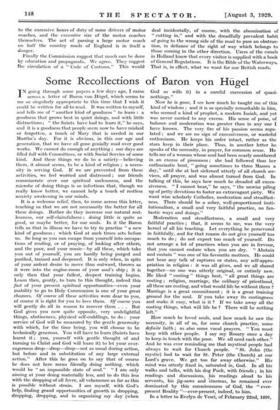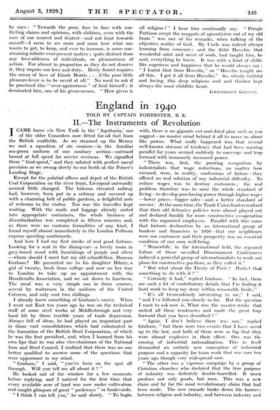Some Recollections of Baron von Hiigel
IN going through some papers a few days ago, I came across a letter of Baron von Hugel, which seems to me so singularly appropriate to this time that I wish it could be written for all to read. It was written to myself, and tells me of " another kind of goodness " to learn : a goodness that grows best in quiet doings, and with little distractions; " the Saints have had to learn it," he says, and it is a goodness that people seem now to have mislaid or forgotten, a touch of Mary that is needed in our Martha's day. For it is obvious, in this our age and generation, that we have all gone genially mad over good works. We cannot do enough of anything ; our days are filled full with Committees, or with Social Service of some kind. And these things we do to a satiety—believing them, it almost seems, to be a kind of religion ; a neces- sity in serving God. If we are prevented from these activities, we feel worried and distressed ; our friends commiserate over our spiritual uselessness, and the microbe of doing things is so infectious that, though we really know better, we cannot help a touch of restless anxiety awakening in our minds.
It is a welcome relief, then, to come across this letter, teaching us that we are not necessarily the better for all these doings. Rather do they increase our natural rest- lessness, our self-claimfulness ; doing little is quite as good, or maybe better, for our souls. In it the Baron tells us that in illness we have to try to practise " a new kind of goodness ; which God at such times sets before us. So long as you can escape from yourself into occupa- tions of reading, or of praying, of looking after others, and the poor, and your music—by all these, which take you out of yourself, you are hardly being purged and purified, trained and deepened. It is only when, in spite of your ardent desire to move thus outward, thrown as it were into the engine-room of your soul's ship ; it is only then that your fullest, deepest training begins. Learn then, gently, to turn to this thought, indeed this fact of your present spiritual opportunities—even your inability to go to Holy Communion is one of your great chances. Of course all these activities were dear to you, of course it is right for you to love them. Of course you will gently do all in reason to recover them . . . But God gives you now quite opposite, very undelightful things, abstinences, physical self-coddlings, to do : your service of God will be measured by the gentle generosity with which, for the time being, you will choose to be technically generous. You will have to learn (Saints have learnt it ; you, yourself with gentle thought of and turning to Christ and God will learn it) to let your over- eagerness drop—drop—drop—not as usual during action, but before and in substitution of any large external action." After this he goes on to say that of course he does not here mean literally doing nothing, which would be " an impossible state of soul." " I am only aiming at your doing materially less, and to do this less with the dropping of all fever, all vehemence as far as this is possible without strain. I am myself, with God's help, finding grand opportunities of growth in dropping, dropping, dropping, and in organizing my day (when God so wills it) in a careful succession of quasi- nothings."
Now he is gone, I see how much he taught me of this kind of wisdom ; and it is so specially remarkable in him, who seemed a kind of prophet, a modern Isaiah, and yet was never carried to any excess. His sense of poise, of balance and moderation was greater than in any one I have known. The very fire of his passion seems regu- lated ; and we see no sign of excessiveness, or wasteful enthusiasm. He keeps his order intact, rather as the stars keep in their place. Thus, in another letter he speaks of the necessity, in prayer, for common sense. He tells me of a woman whose soul had been nearly smothered in an excess of piousness ; she had followed thus her enthusiastic bent, " going sometimes to three Masses a day," until she at last sickened utterly of all church ser- vices, all prayer, and was almost turned from God. In talking of this, he says how much he dreaded all exces- siveness. " I cannot bear," he says, " the unwise piling up of petty devotions to foster an extravagant piety. We want wise scholarly Catholics, moderation and steadfast- ness. There should be a sober, well-proportioned insti- tutionalism, a small and very faithful practice, no fan- tastic ways and doings."
Moderation and steadfastness, a small and very faithful practice ; that, it seems to me, was the very kernel of all his teaching. Let everything be persevered in faithfully, and for that reason do not give yourself too much to do ; do not expect too much of yourself. Do not arrange a lot of practices when you are in fervour, that you cannot endure when you are dry. " Abstain and sustain " was one of his favourite mottoes. He could not bear any talk of raptures or states, any self-appro- priation in religion : it was all given, and we all shared together—no one was utterly original, or entirely new. He liked " costing " things best, " all great things are costing ; religion, marriage, the celibacy of priesthood, all these are costing, and what would life be without them ? Marriage is a great commitment ; it is a great training ground for the soul. If you take away its costingness and make it easy, what is it ? If we take away all the costing things, what will life be ? There will be nothing left."
How much he loved souls, and how much he saw the necessity, in all of us, for some church practice, some definite faith ; as also some vocal prayers. " You must keep with other people. I say my Rosary once a day to keep in touch with the poor. We all need each other." And he was ever reminding me that mystical people had always to wait for Church people. " St. John (the mystic) had to wait for St. Peter (the Church) at our Lord's grave. We get too far away otherwise." His mind was utterly fixed in, saturated in, God. In all his walks and talks, with his dog Puck, with friends ; in his readings and discussions, his readings aloud to his servants, his jig-saws and cinemas, he remained ever dominated by this consciousness of God, the " ever- present Reality "—ever-present; indeed, to him.
In a letter. to Evelyn de Vesci, of February 22nd, 1891, he says : " Towards the poor, face to face with con- flicting claims and opinions, with children, even with the care of our nearest and dearest—and not least towards oneself—I seem to see more and more how what one wants to get, to keep, and ever to increase, is some con- straining infinite ever-present motive ; quite distinct from any love-ableness of individuals, or pleasantness of action. For almost in proportion as they do not deserve it, they require our love and duty. Hetty Sorrel requires the ocean of love of Dinah Morris . . . if the poor little pleasure-lover is to be saved at all." No need to ask if he practised this " over-againstness " of God himself ; it dominated him, one of his given-nesses. " How given is all religion ! " I hear him continually say. " Pringle Pattison swept the maggots of agnosticism out of my old brain " was one of his remarks, when talking of the objective reality of God. My Uncle was indeed always learning from someone ; and the Abbe Huvelin, that wonderful saint and saver of souls, had taught him, he said, everything he knew. It was with a kind of child- like eagerness and happiness that he would always say : " I learnt that from Huvelin," or " Huvelin taught me all this. I got it all from Huvelin." So, utterly faithful and loving, this deep religious soul and thinker kept always the most childlike heart.
GWENDOLEN GREENE.



































 Previous page
Previous page